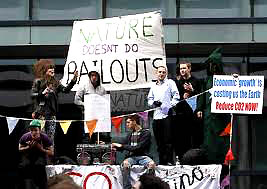
Green activism is often a threat to the very environment that activists are trying to save. The immediate action of calling for biofuel, for example, does not achieve the long-term goal of cutting carbon emissions. Subsidies for ethanol are currently so large that one-sixth of the world’s corn crop is turned into fuel for American cars. This increases food prices, which hurts the poor and entices other countries to burn native forests to make way for agriculture. The outcome: More emissions generated than saved from biofuels over the next century, writes author Bjorn Lomborg
Another misguided campaign includes environmental protestors throwing a monkey wrench — Edward Abbey style — into the gears of the timber industry with the hope of saving U.S. forests. This effort led to increased forest density and poor forest health, creating more fuel for catastrophic fires, a loss of jobs, and the economic collapse of entire towns.
Oddly, the ecological headaches produced by such policies do not dim the luster of green political activism. Indeed, the resultant problems often lead to more calls for intervention, which only increases the costs we all pay for such policies.
It is time to look for smarter solutions to environmental problems — solutions that connect actions to positive outcomes. Enviropreneurs, a term coined by PERC, are doing just that. This new breed of environmentalist starts with the outcome and asks what action or incentives are required to achieve the goal. The next step is to contract with input owners to effectively conserve resources. In this way, the environment becomes an asset to be cultivated.
Chris Corbin, for example, loves fish and the water they inhabit. Rather than lobby government to support his cause, he started Lotic LLC, a water marketing company. Corbin’s work focuses on the confluence of economic prosperity and water conservation, or as he puts it, “where blue turns into green.” Green means profitably leasing water to protect trout habitat, trading water rights through wetlands mitigation banks, and increasing operational efficiency by selling conserved water to growing municipalities. In just two years, Lotic has completed 30 water rights consulting projects in 18 states.
Another illustration is Hank Fischer. Fischer is keen on endangered species — primarily the big, hairy type. He realized that it was economics that made ranchers hate wolves, so he started a wolf compensation program through Defenders of Wildlife. Financed by private donors, this fund (more than a million dollars paid out thus far) has helped reduce the opposition to wolves and shift the economic burden of wolf recovery from livestock producers to those who support wolf reintroduction.
Defenders is currently transitioning out of this landmark program by providing support to Western tribes and states to help them start their own incentive-based programs. In Oregon, for example, a fund for ranchers called Community Alliance Livestock Fund, or CALF, was recently launched.
Before signing up for an EMO on Earth Day, consider that a better long-term strategy for Mother Earth might entail a little more economics and a little less activism.



